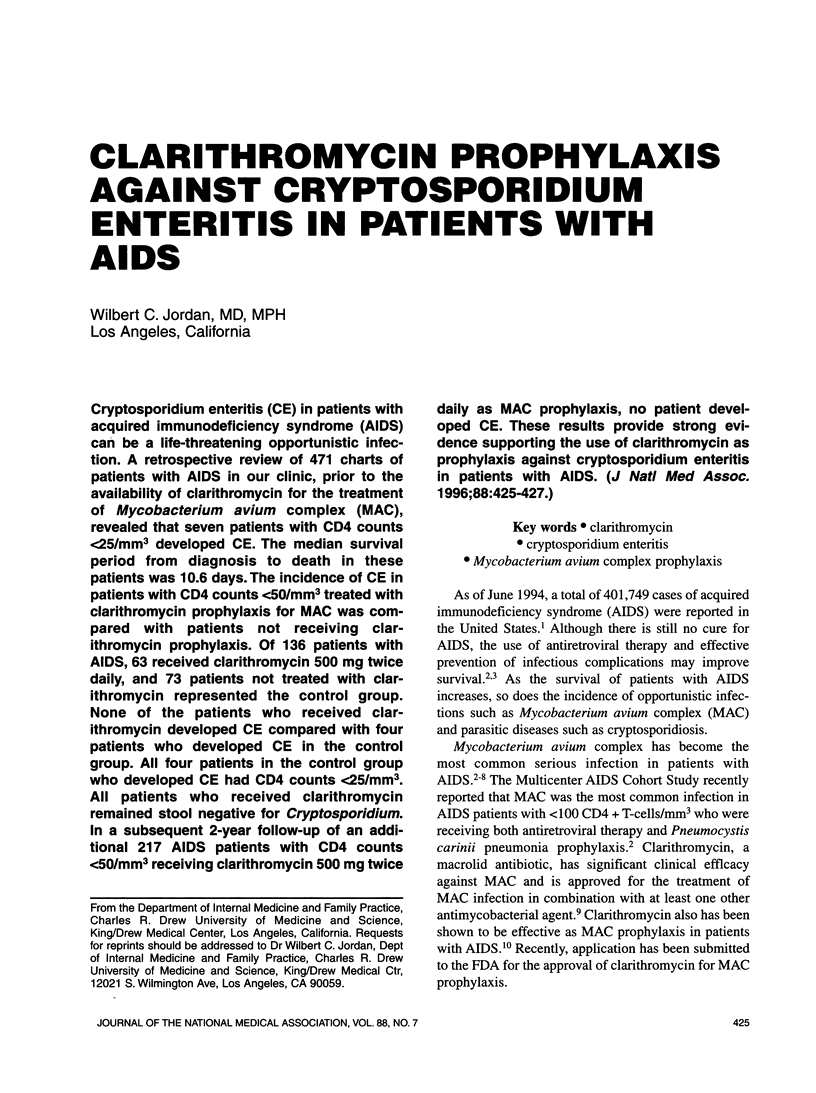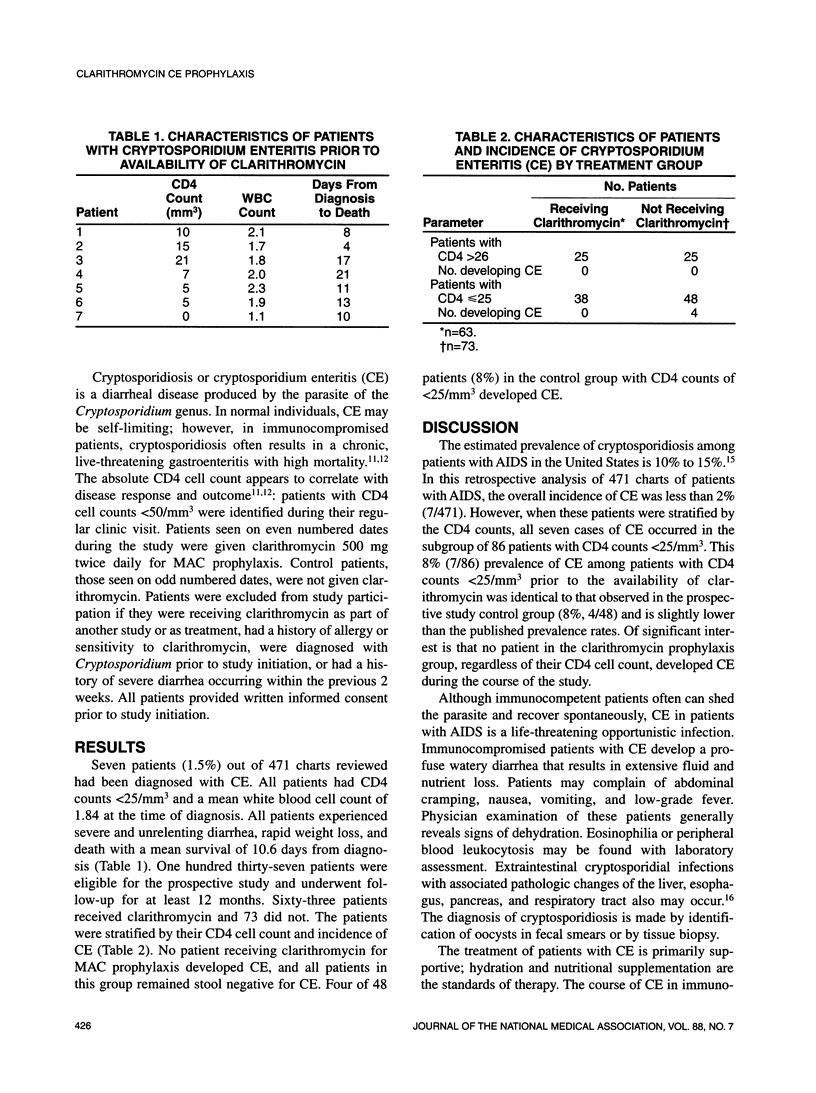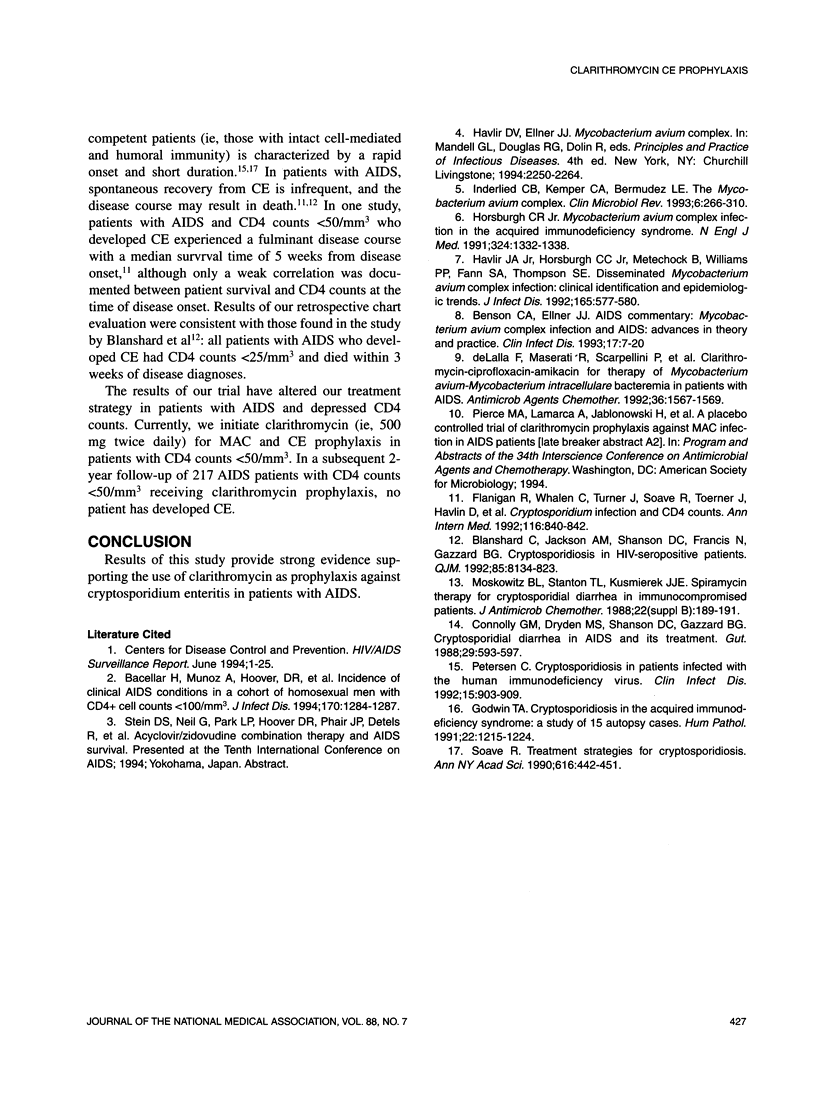Abstract
Cryptosporidium enteritis (CE) in patients with acquired immunodeficiency syndrome (AIDS) can be a life-threatening opportunistic infection. A retrospective review of 471 charts of patients with AIDS in our clinic, prior to the availability of clarithromycin for the treatment of Mycobacterium avium complex (MAC), revealed that seven patients with CD4 counts < 25/mm3 developed CE. The median survival period from diagnosis to death in these patients was 10.6 days. The incidence of CE in patients with CD4 counts < 50/mm3 treated with clarithromycin prophylaxis for MAC was compared with patients not receiving clarithromycin prophylaxis. Of 136 patients with AIDS, 63 received clarithromycin 500 mg twice daily, and 73 patients not treated with clarithromycin represented the control group. None of the patients who received clarithromycin developed CE compared with four patients who developed CE in the control group. All four patients in the control group who developed CE had CD4 counts < 25/mm3. All patients who received clarithromycin remained stool negative for Cryptosporidium. In a subsequent 2-year follow-up of an additional 217 AIDS patients with CD4 counts < 50/mm3 receiving clarithromycin 500 mg twice daily as MAC prophylaxis, no patient developed CE. These results provide strong evidence supporting the use of clarithromycin as prophylaxis against cryptosporidium enteritis in patients with AIDS.
Full text
PDF


Selected References
These references are in PubMed. This may not be the complete list of references from this article.
- Bacellar H., Muñoz A., Hoover D. R., Phair J. P., Besley D. R., Kingsley L. A., Vermund S. H. Incidence of clinical AIDS conditions in a cohort of homosexual men with CD4+ cell counts < 100/mm3. Multicenter AIDS Cohort Study. J Infect Dis. 1994 Nov;170(5):1284–1287. doi: 10.1093/infdis/170.5.1284. [DOI] [PubMed] [Google Scholar]
- Blanshard C., Jackson A. M., Shanson D. C., Francis N., Gazzard B. G. Cryptosporidiosis in HIV-seropositive patients. Q J Med. 1992 Nov-Dec;85(307-308):813–823. [PubMed] [Google Scholar]
- Flanigan T., Whalen C., Turner J., Soave R., Toerner J., Havlir D., Kotler D. Cryptosporidium infection and CD4 counts. Ann Intern Med. 1992 May 15;116(10):840–842. doi: 10.7326/0003-4819-116-10-840. [DOI] [PubMed] [Google Scholar]
- Godwin T. A. Cryptosporidiosis in the acquired immunodeficiency syndrome: a study of 15 autopsy cases. Hum Pathol. 1991 Dec;22(12):1215–1224. doi: 10.1016/0046-8177(91)90103-v. [DOI] [PubMed] [Google Scholar]
- Horsburgh C. R., Jr Mycobacterium avium complex infection in the acquired immunodeficiency syndrome. N Engl J Med. 1991 May 9;324(19):1332–1338. doi: 10.1056/NEJM199105093241906. [DOI] [PubMed] [Google Scholar]
- Inderlied C. B., Kemper C. A., Bermudez L. E. The Mycobacterium avium complex. Clin Microbiol Rev. 1993 Jul;6(3):266–310. doi: 10.1128/cmr.6.3.266. [DOI] [PMC free article] [PubMed] [Google Scholar]
- Soave R. Treatment strategies for cryptosporidiosis. Ann N Y Acad Sci. 1990;616:442–451. doi: 10.1111/j.1749-6632.1990.tb17863.x. [DOI] [PubMed] [Google Scholar]
- de Lalla F., Maserati R., Scarpellini P., Marone P., Nicolin R., Caccamo F., Rigoli R. Clarithromycin-ciprofloxacin-amikacin for therapy of Mycobacterium avium-Mycobacterium intracellulare bacteremia in patients with AIDS. Antimicrob Agents Chemother. 1992 Jul;36(7):1567–1569. doi: 10.1128/aac.36.7.1567. [DOI] [PMC free article] [PubMed] [Google Scholar]


